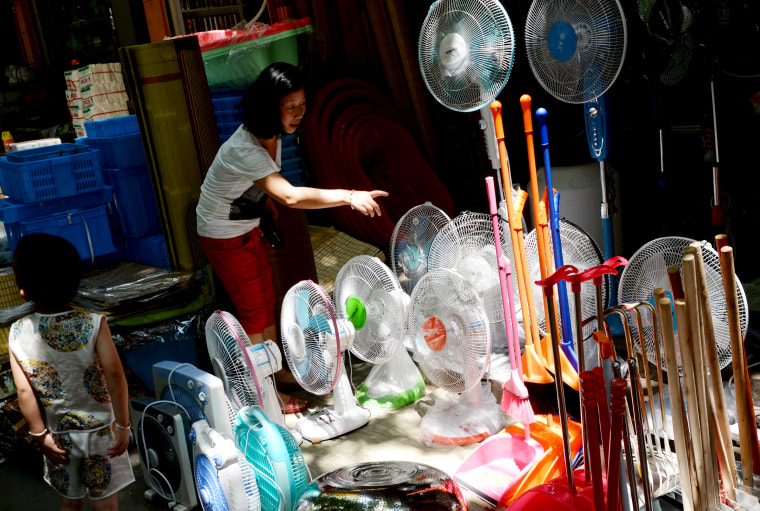When it's hot out but dry, an electric fan is not your friend: It won't cool you off, and can make your body strain harder to fight the heat.
A small study from Australia, published Monday in the Annals of Internal Medicine, looked at what goes on in the body when a person tries to cool off with a fan in different climate conditions.
The researchers, from the University of Sydney, measured the vitals of 12 healthy young men while they sat in a climate chamber — a closed room that replicates different environmental conditions — and found that fans were more effective at cooling the body in hot, humid conditions compared with hot, dry conditions.
The men had four sessions in the climate chamber, with the temperature raised to either a humid 104 degrees Fahrenheit or a dry 117 degrees, for two hours at a time. Under the humid conditions, the heat index reached 133 degrees, and under the dry conditions, it reached 115 degrees.
Each condition was tested with and without an electric fan placed about 4 feet away. Sensors measured the men's vitals — including heart rate and rhythm, core temperature, whole-body sweat rate, and blood pressure — while they were in the chamber.
Taken together, these vital measurements provide a snapshot of the amount of physiological strain a person is experiencing.
Based on these measurements, one session was clearly the worst: the hot and dry one, coupled with the electric fan. Under these conditions, the men saw the greatest changes in all of their vitals, except for blood pressure.
Though the conditions used in the study may sound extreme, the researchers noted that they do line up with some real-world examples. Indeed, the hot, dry conditions may be seen in the Southwest U.S. in the summer.
What's going on?
One of the keys to human cooling is evaporation; namely, sweat evaporating off of the skin. Fans increase the rate of evaporation by moving air over skin, and more evaporation means cooler skin.
But in dry conditions, the body wants to hold onto the water it has, so it sweats less. Without sweat on the skin, there's nothing to evaporate, and the fan instead simply blows warm air over the body. The result is that it hurts the cooling process, instead of helping it.
The idea that fans may be detrimental in extreme heat is not new: The Environmental Protection Agency recommends only using fans when the the temperature is below 95 degrees.
In fact, the new study found that fans were still effective above that threshold — namely, in the hot and humid condition where the temperature reached 117 degrees.
“Our data shows that fan use is beneficial for cooling above the temperature thresholds currently advised by most public health agencies,” lead author Ollie Jay, associate professor of health science at the University of Sydney, told NBC News.
But those thresholds don't take humidity into account, Jay said. Under humid conditions, a person sweats more, meaning a fan can induce more evaporation and cooling. (Without a fan blowing on the body, sweat doesn't evaporate as easily in humid air, which is why humidity can make it feel hotter than it actually is.)
High temperatures during a heat wave are especially dangerous for older adults and those with medical conditions.
According to the Centers for Disease Control and Prevention, more than 600 people die every year of extreme heat, but that may be an underestimation because heat-related illnesses, such as heat stroke and heat exhaustion, do not require reporting to public health agencies.
Often times, both high temperature and relative humidity play a role in heat-related deaths and hospitalizations, but measuring humidity is not intuitive to most people, and can't be done by just feel alone.
Currently, the EPA recommends using ceiling and window fans in “moderately hot weather” over standing fans because they more effectively cool a room by creating a draft. They also recommend turning fans off in empty rooms as “fans cool people, not rooms.”
Jay noted that while more research is needed to justify universal guideline changes on fan use, the study does explain why fan use would be better suited for certain areas over others.
“While fan use in very, hot but arid conditions such as the south central U.S., Middle East, and South Australia is not advisable, these study results do support fans as a cheaper and more accessible alternative to air conditioning in many areas of the U.S., Asia, South America and Europe that experience high temperatures and moderately high humidity during a heat wave,” Jay said.
Still, the Australian study is a proof of concept and more research is needed to see if the results also apply to a more diverse range of participants, including women, people of different ages, and people taking medications. The authors also noted that many heat waves do not reach the temperature extremes used in the study.
Follow NBC HEALTH on Twitter & Facebook.



